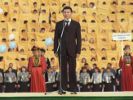Eye For Film >> Movies >> Planet Kirsan (2010) Film Review
Do you like documentaries about places you've never heard of? I love them. They're always worth seeking out at Sheffield's Doc/Fest. There will always be one about an ex-Soviet republic with a very strange leader. Do they make these places up? How about Kalmykia? This really does exist. I've looked it up. Its first and only president, Kirsan Ilyumzhinov, was inaugurated in 2002.
Search for the website of its capital, Elista, and you will find the following: “The city is carrying out the gradual greening and municipal improvements, laid are new parks, repaired roads, flower beds and loans (sic), pavement and lighting of walkways.” Wow! It sounds better than where I live.

But what about this president? Kirsan was only 15 in 1999 when he became the country's first chess champion. Now he considers chess to be the key to everything. He has decreed that it shall be taught in all schools in the republic and has established a chess academy for the brightest players.
Chess City could be in Florida - smart, modern and somewhat sterile. But it rises incongruously from the barren, windy Steppe, where the film opens with a young girl wearing a hat in the shape of a chess knight. She turns up throughout the film, looking on, providing a visual link. Pieta takes a look at what it's like to be a child growing up in this republic with its chess obsession.
Very young schoolchildren are shown a giant chessboard and taught to name the pieces. Two slightly older children are being trained, rather harshly, to become champions. Amir and Alekhan laugh together as they talk about their ambitions. “I will be playing in championships and be very rich.” “I want to be world champion at least.” “So do I.” But for Alekhan it's an uphill struggle.
When it comes to the Championship of the Republic, dozens of children, mostly boys, file in to the glamorous new hall to register. The officials look kindly, but the children soon look pressured, Alekhan in particular. His tutor sits outside smoking, ready to scold him if he loses. The scenes of chess playing inside the hall are intercut with an elaborate pageant celebrating 400 years of being in the Russian Empire. Kalmykia is the only Buddhist republic in Europe and obviously very proud of its identity. Kirsan himself pays a visit and makes a staggeringly fanciful speech. Apparently Mendeleev, developer of the periodic table, had Kalmykian blood in his veins. So did Lenin. Who knew?
Moreover, DNA consists of 64 units, just like the squares on a chessboard. “It's like a cosmic message sent to us. There are many religions...” Kirsan names all the ones he can remember... “Religions come and go, but chess remains.” If we live by the principles of chess, good will triumph over evil, etc. etc.
As the chess playing continues, we are meant to feel the tension through “silent” scenes where all the ambient sound is removed and replaced with repetitive electronic sound. It's a device often used to involve the viewer. But here it goes on for rather too long and becomes irritating. And there's that girl again, the one with the knight's hat, looking on rather complacently. Alekhan doesn't do very well. Sitting alone with the camera, he says “I wish I could leave and go to Grozny.” That's where he was born. That's where the love of his life lives. Of course there's a war going on there but.... It's funny and also very sad. It's a boy's life in a dictatorship, albeit not one of the worst. Magdalena Pieta has made a very thought-provoking film.
Reviewed on: 12 Jun 2011


















